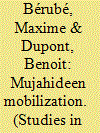| Srl | Item |
| 1 |
ID:
073271


|
|
|
|
|
| Publication |
Cambridge, Cambridge University Press, 2006.
|
| Description |
xii, 291p.
|
| Standard Number |
0521616425
|
|
|
|
|
|
|
|
|
|
|
|
Copies: C:1/I:0,R:0,Q:0
Circulation
| Accession# | Call# | Current Location | Status | Policy | Location |
| 051543 | 363.3/WOO 051543 | Main | On Shelf | General | |
|
|
|
|
| 2 |
ID:
164594


|
|
|
|
|
| Summary/Abstract |
Drawing on Tilly’s notion of “repertoire of action,” this article shows how the evolution of the global jihadist movement’s communicative action repertoire has increased the potential resonance of its discourse. It foresees the construction of the global jihadist movement’s discourse of mobilization as the result of the evolution of its network of actors, the context in which its communications are undertaken, and its adaptation to new communication technologies. Accordingly, it argues that the decentralization of the global jihadist movement has led to a widening of its communicative action repertoire and a diversification of its discourse offering.
|
|
|
|
|
|
|
|
|
|
|
|
|
|
|
|
| 3 |
ID:
114631


|
|
|
|
|
| Publication |
2012.
|
| Summary/Abstract |
Social researchers are facing more and more challenges as criminal networks are expanding in size and moving to the Internet. Many efforts are currently under way to enhance the technical capabilities of researchers working in the field of cybercrimes. Rather than focusing on the technical tools that could enhance research performance, this article focuses on a specific field that has demonstrated its use in the study of criminal networks: social network analysis (SNA). This article evaluates the effectiveness of SNA to enhance the value of information on cybercriminals. This includes both the identification of possible targets for follow-up research as well as the removal of subjects who may be wasting the researchers' time. This article shows that SNA can be useful on two levels. First, SNA provides scientific and objective measures of the structure of networks as well as the position of their key players. Second, fragmentation metrics, which measure the impact of the removal of n nodes in a network, help to determine the amount of resources needed to deal with specific organisations. In this case study, a tactical strike against the network could have had the same destabilising impact as a broader approach. The resources saved by limiting the investigation targets could then be used to monitor the criminal network's reaction to the arrests and to limit its ability to adapt to the post-arrest environment.
|
|
|
|
|
|
|
|
|
|
|
|
|
|
|
|